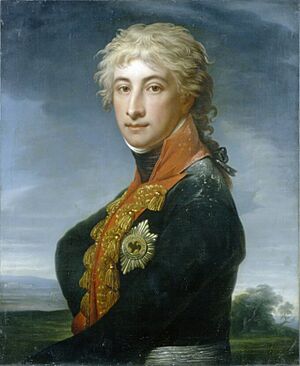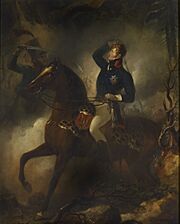Prince Louis Ferdinand of Prussia (1772–1806) facts for kids
Quick facts for kids Prince Louis Ferdinand of Prussia |
|||||
|---|---|---|---|---|---|

Portrait by Jean-Laurent Mosnier, 1799
|
|||||
| Born | 18 November 1772 Friedrichsfelde Palace, Berlin |
||||
| Died | 10 October 1806 (aged 33) Battle of Saalfeld |
||||
|
|||||
| House | House of Hohenzollern | ||||
| Father | Prince August Ferdinand of Prussia | ||||
| Mother | Elisabeth Louise of Brandenburg-Schwedt | ||||
Prince Louis Ferdinand of Prussia (born Friedrich Ludwig Christian; November 18, 1772 – October 10, 1806) was a Prussian prince, soldier, and a talented musician. He was known for his bravery in battles during the Napoleonic Wars. He was also a skilled composer and pianist. A German film about his life, Prinz Louis Ferdinand, was made in 1927.
Contents
Early Life and Family
Louis Ferdinand was born on November 18, 1772, at Friedrichsfelde Palace near Berlin. His parents were Prince August Ferdinand of Prussia and Elisabeth Louise of Brandenburg-Schwedt. This made him a nephew of the famous King Frederick the Great. He was given the name Friedrich Ludwig Christian. However, people called him Louis, and he soon got the nickname Ferdinand, after his father. This helped tell him apart from another relative, Prince Friedrich Ludwig Karl of Prussia, who was also named Louis.
A Brave Military Career
Prince Louis Ferdinand was a dedicated soldier. He fought in the French Revolutionary Wars from 1792 to 1794. He took part in important events like the Valmy cannonade and was injured during the Siege of Mainz. He quickly rose through the ranks, becoming a major general. In November 1793, he fought in the Battle of Kaiserslautern. By 1799, he was promoted to lieutenant general.
In 1806, Louis Ferdinand strongly supported going to war against Napoleon. This led to the War of the Fourth Coalition.
He died in the very first battle of this war, the Battle of Saalfeld. Prince Louis Ferdinand was leading about 8,300 soldiers. They faced a much larger French army of 12,800 men, led by Marshal Jean Lannes. The French had the advantage of higher ground, and the Prussian forces had the Saale River behind them, making retreat difficult. When he saw his troops starting to lose, Louis Ferdinand bravely charged the French cavalry. He was killed in the fight by a French soldier after he refused to surrender. His death was a big loss for Prussia.
Musical Talents and Compositions
Besides being a soldier, Louis Ferdinand was also a very talented musician and composer. Johann Friedrich Reichardt, a famous music director, thought he was a great pianist. Louis Ferdinand started composing music early on. His first pieces were played by the orchestra of Prince Henry, Frederick the Great's brother.
He often played the piano and improvised at musical gatherings in Berlin. He was friends with important figures in German Romanticism, like Schlegel and Tieck, who loved music. Even the famous composer Ludwig van Beethoven dedicated his Third Piano Concerto to him. This showed how much Beethoven respected his piano playing.
Louis Ferdinand died young, so he only published 13 musical pieces with opus numbers. Most of these are chamber works, which are pieces for a small group of instruments. He also wrote two rondos for piano and orchestra. All his surviving works feature the piano.
His music was quite new for his time. It was more expressive and personal than the usual Classical style. Many people see him as a pioneer of the Romantic movement. For example, the composer Robert Schumann called him "that most Romantic of all princes." His friendships with key figures in German Romanticism likely influenced his musical style. In 1842, Franz Liszt even wrote a piano piece inspired by Louis Ferdinand's music.
Musical Works
Here is a list of Prince Louis Ferdinand's published musical compositions:
- Opus 1: Piano Quintet in C minor (published 1803)
- Opus 2: Piano Trio No. 1 in A-flat major (published 1806)
- Opus 3: Piano Trio No. 2 in E-flat major (published 1806)
- Opus 4: Andante with Variations in B-flat major for piano quartet (published 1806)
- Opus 5: Piano Quartet No. 1 in E-flat major (published 1806)
- Opus 6: Piano Quartet No. 2 in F minor (published 1806)
- Opus 7: Fugue in G minor for piano (published 1807)
- Opus 8: Notturno in F major for flute, 2 horns and piano quartet (published 1808)
- Opus 9: Rondo No. 1 in B-flat major for piano and orchestra (published 1808)
- Opus 10: Piano Trio No. 3 in E-flat major (published 1806)
- Opus 11: Larghetto with Variations in G major for piano quintet (published 1806)
- Opus 12: Octet in F minor for clarinet, 2 horns, 2 violins, 2 cellos and piano (published 1808)
- Opus 13: Rondo No. 2 in E-flat major for piano and orchestra (published 1823)
See also
 In Spanish: Luis Fernando de Prusia (1772-1806) para niños
In Spanish: Luis Fernando de Prusia (1772-1806) para niños
 | Bessie Coleman |
 | Spann Watson |
 | Jill E. Brown |
 | Sherman W. White |


